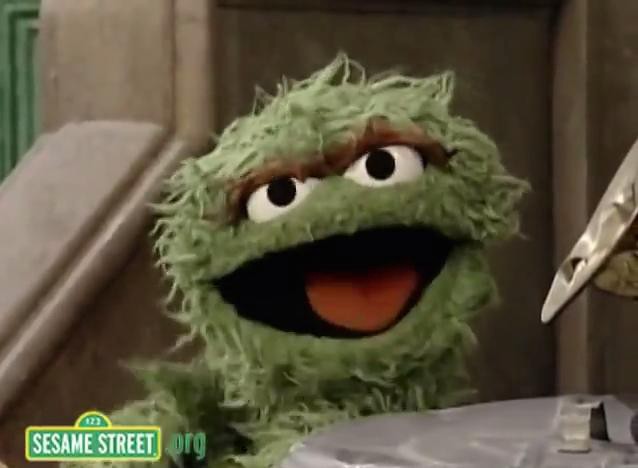How Muppets Do Money: Oscar

“So I’ve done the math,” Oscar said, “and here’s the deal. Let’s say you put away 20% of your salary in a retirement savings account. That means you’ve got to work five years to get enough money to fund one year of retirement. And sure, you’re going to get some interest, but you can’t trust the stock market and your interest might not even outpace inflation. Plus you’re expected to downsize when you retire, but what am I supposed to do — move into a smaller trashcan?”
Unlike Big Bird, Oscar was very eager to talk about money. His trashcan was stacked with personal finance books — I Will Teach You To Be Rich, Rich Monster Poor Monster, Think And Grow Rich — and it was clear he had done all the math and was ready to prove why each financial expert was wrong.
“Look,” he said, “Rich Monster isn’t even a real monster. The author made him up to sell books. When the best financial advice you can get is stuff like this, how can a Grouch like me ever get ahead?”
I asked him if he wanted to talk about his current income, net worth, or savings strategy.
“Ha,” Oscar said. “My net worth is in the can. I tried using the Trashball Method to pay down my credit card debts, but even then it was going to take years to pay everything off. Why spend years throwing every extra penny you have against a debt?”
I asked Oscar how he handled his credit card payments now, and he said he paid the minimum every month. “I’ve done the math,” he said again. He lives a modest life in his trashcan, with a debt burden in the low five figures, and doesn’t have much in the way of savings or a retirement fund.
“How am I supposed to save?” Oscar asked. “Cutting back on lattes? Like you can build a financial future on $624 a year.”
Clearly seeing my confusion, he explained.
“Three lattes a week at four dollars per latte comes out to a savings of $624 per year.”
I asked Oscar if he drank lattes, and he said “Yucch!” and then explained that the majority of his money went towards rent, utilities, food, credit card payments, and an array of electronics.
“Oh, are you going to be one of those financial experts who tells me I shouldn’t have those?” he asked. “Are you going to say something stupid like I should go to the library to use the internet? I need the internet, and my laptop and smartphone, to do my job.”
I assured him that I was in no way a financial expert, and asked him to talk to me about his income. Oscar spends part of his time running the non-profit after-school program Grouchketeers, and earns the rest of his income from his trashcan, working a series of Gig Economy jobs.
“I like answering those surveys,” Oscar told me. “It makes me so happy to click Strongly Disagree.”
Oscar’s doing about as well as can be expected, financially. There are many months when his income exceeds his expenses; if it doesn’t, he dips into those credit cards that he’s paying off one minimum payment at a time. He loves his work with the Grouchketeers, loves his trashcan, loves his friends (even though he asked me to keep that part off the record) and doesn’t see any possible way that he could run his financial life any differently.
After all, he’s done the math.
Previously on How Muppets Do Money: Big Bird
Support The Billfold
The Billfold continues to exist thanks to support from our readers. Help us continue to do our work by making a monthly pledge on Patreon or a one-time-only contribution through PayPal.
Comments